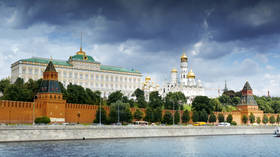G7 fails to finalize plans for tapping Russian assets
Redirecting the money to Kiev still poses a slew of technical and legal problems, Italy says
The G7 has not reached a consensus on how to use the revenue generated by Russian central bank assets frozen abroad to help Ukraine, Italian Economy Minister Giancarlo Giorgetti announced on Saturday.
Italy holds the group’s presidency this year, and hosted this week’s two-day meeting of the G7 finance ministers in the town of Stresa.
At a press conference at the end of the summit, Giorgetti said the group made progress on the Russian assets issue, but “has yet to finalize” the process because it still “presents significant technical and legal problems.”
Speaking to reporters on Friday, he added that the parties were trying to reach a “politically desirable solution” that would be “incontestable from a legal point of view,” and finding it takes time. Giorgetti noted that the final decisions for the move will likely be made at the June G7 leaders’ summit in Puglia.
Following the start of the Ukraine conflict in early 2022, Western countries blocked around $300 billion in assets belonging to Russia’s central bank as part of the sanctions on Moscow. Roughly two-thirds of these funds are held in the EU clearing house Euroclear, and the rest is mostly sitting untapped in other EU nations, with around $5 billion in the US.
While Washington has been eager to seize the assets outright, the G7 is reportedly not considering this option due to concerns of its European members that it would damage their financial credibility and discourage other countries from keeping their assets in the bloc. Instead, the group is focused on ways to tap the profits generated by the assets, and how to use them.
According to reports citing the summit’s attendees, one of the most widely discussed options is using future profits from the frozen funds as collateral for a multibillion-dollar loan to Kiev. However, German Finance Minister Christian Lindner told reporters on Friday that “it is still to be seen whether it will be possible to introduce such an instrument” due to the legal repercussions it may bring.
Another option that has reportedly been discussed is allocating the proceeds from the frozen assets directly to Ukrainian leader Vladimir Zelensky, with 90% of the sum to be used on weapons purchases, while the remaining 10% would go to the reconstruction of the country.
Russia has warned against any actions targeting its assets, saying they would amount to theft, while vowing retaliation. Earlier this week, President Vladimir Putin signed a decree outlining a mechanism that would allow Moscow to seize property owned by US-linked entities and citizens through court if Washington attempts to confiscate Russian assets held abroad.
For more stories on economy & finance visit RT’s business section






Comments are closed.